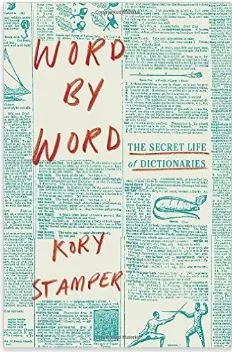This week's read is Word by Word: The Secret Life of Dictionaries by Kory Stamper. Part memoir, part history, and part love letter to the English language, this funny and enlightening book is a thoroughly enjoyable romp through the world of lexicography. A behind-the-scenes book about how dictionaries are written might sound dull, but Word by Word is smart, entertaining, and more fascinating than it has any right to be.
A love letter to language
When's the last time you really thought about how your handy dictionary was actually written? After reading Word by Word, you'll never take a definition for granted again. Stamper pulls back the curtain to show what exactly is involved in the day-to-day life of a lexicographer at Merriam-Webster -- and it's more challenging and involved than you'd expect.
Full disclosure: I'm a word nerd from way back -- I know, surprise, surprise! -- but loved Word by Word even though the book cheerfully demolishes grammar and language snobbery in its spirited defense of our ever-evolving English language. (To wit: "On fleek" is now part of our vocabulary simply because a 16 year old YouTuber decided back in 2015 that this was how best to describe her perfectly groomed eyebrows!)
Along the way we find out everything from why "irregardless" is actually a word (although still cringe-worthy, it is indeed defined in the Merriam-Webster dictionary) to when and how the definition of marriage was expanded to included "the state of being united to a person of the same sex in a relationship like that of a traditional marriage" (and about the backlash and emails that ensued). Throughout, Stamper emphasizes that lexicographers write definitions to describe an ever-evolving language, rather than to prescribe what English should ideally be. Word by Word provides a frank examination of how our language -- and grammar -- is inseparable from the culture in which it evolves.
We think of English as a fortress to be defended, but a better analogy is to think of English as a child. We love and nurture it into being, and once it gains gross motor skills, it starts going exactly where we don't want it to go: it heads right for the goddamned electrical sockets. We dress it in fancy clothes and tell it to behave, and it comes home with its underwear on its head and wearing someone else's socks. As English grows, it lives its own life, and this is right and healthy. Sometimes English does exactly what we think it should; sometimes it goes places we don't like and thrives there in spite of all our worrying. We can tell it to clean itself up and act more like Latin; we can throw tantrums and start learning French instead. But we will never really be the boss of it. And that's why it flourishes.
If you love language, you'll love Word by Word.
In the area?
Kory Stamper will be speaking at the Oak Park Public Library next week! If I didn't have a scheduling conflict, I'd totally be there. 🙁
Can't go? You can also follow her on twitter here (which I just did because I'm kind of a social media stalker), and watch her in some of Merriam-Webster's "ask the editor" videos here, and listen to her Fresh Air interview on NPR here -- where you learn how she was the one to add the term "bodice ripper" to the dictionary, and more.
What are you reading this week?
What have you been reading lately? Tell us about it! ? You can browse all the What’s Rachel Reading? book reviews here.


Carol
Sunday 23rd of April 2017
I'm reading Ella Minnow Pea, about a fictitious island that systematically eliminates letters of the alphabet from use. It is a little older, but I just heard about it. Related to this discussion, I suggest A Way With Words podcast. They are always exploring words and phrases. One of the hosts is a former dictionary editor.